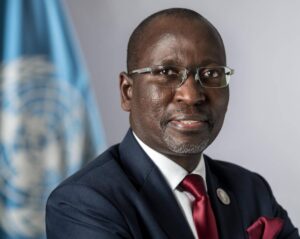By Collen Vixen Kelapile, U.N. Economic and Social Council
Climate change has become the enemy of human progress and a threat to humanity’s survival. We see its devastating consequences daily. No country is immune.
In Latin America and the Caribbean, the Atlantic hurricane season is ready to hit hard again with heavy rains and floods, possibly destroying homes, displacing people, damaging crops and disrupting livelihoods. The Asia-Pacific region is confronted with sea-level rise. Meanwhile, in the horn of Africa, vulnerable populations are suffering a humanitarian catastrophe as drought’s severity increases. My own country, Botswana, a landlocked and already predominantly arid country in southern Africa, is suffering the severe impacts of dry conditions and deforestation. The United States faces another record-breaking wildfire season as several states experience a heightened threat of heat waves.

The explanation for these trends is clear. We are aware of what is happening, and why. We have become experts at documenting the multifaceted factors and nature of climate impacts. Scientists, citizens, indigenous communities and young people around the world are raising their voices.
We need action. Everyone needs to do their part — first and foremost, the biggest polluters, including the wealthiest countries in the Group of 20. This is the year to walk the talk. The U.N. Climate Change Conference (COP27) in November in Egypt needs to be a milestone in delivering impactful outcomes for people and our planet. Let us turn this year into one where the international community rallies around robust and more ambitious climate action.
With the global average temperature at about 33.98 degrees Fahrenheit above pre-industrial levels today, the climate crisis has truly arrived and its impacts are being felt across the world. The latest report by the Intergovernmental Panel on Climate Change (IPCC) indicates that global temperatures are likely to rise by more than 2.7 degrees Fahrenheit by the end of this century — the limit at which runaway climate change will begin to upend life as we know it.
According to the U.N.’s Department of Economic and Social Affairs, global emissions are set to increase by almost 14% over the current decade. This threatens the lives and livelihoods of millions. The oceans are getting warmer, more acidic and holding less oxygen. More than half of the world’s marine species may stand on the brink of extinction by 2100.
Forest degradation and deforestation are responsible for the further loss of biodiversity and species. The Food and Agriculture Organization of the United Nations stressed that deforestation has led to the loss of 1 billion acres of forest between 1990 and 2020.
At the same time, millions of people around the world have been pushed deeper into extreme poverty. Public investments in social-safety nets, education and climate resilience must be promoted to reduce fragility to future shocks.
Inequality is rising. The gap between developed and developing countries is growing. The Sustainable Development Goals — the commitments made by world leaders in 2015 to end extreme poverty, inequality and climate change by 2030 — are in crisis and in need of a renewed sense of urgency.
These trends have unfolded alongside the COVID-19 pandemic, reversing decades of progress toward sustainable development. This is compounded by the impact of the war in Ukraine — driving refugee flows, causing severe disruptions of global supply chains for essential commodities and contributing to food insecurity. The recent United Nations World Economic Situation and Prospects (WESP) report stressed that, as countries look to expand energy supplies amid high oil and gas prices, fossil-fuel production is likely to increase in the short term.
Time is running out to preserve a livable planet. A business-as-usual approach no longer is an option. We need to do more to change how we live, produce, consume and interact with nature.
The solutions to the climate challenge are clear: We must end our addiction to fossil fuels. This means phasing out coal and moving from oil and gas to renewable sources of energy, such as wind and solar. Renewables, in most cases, already are cheaper than fossil fuels today. We need to put them to work, urgently, at scale and speed.
But in order to transform energy systems everywhere, and at the same time build resilience and adapt to the inevitable impacts of climate change, the climate finance commitments presented at the COP26 Climate Conference in Glasgow last November must be honored. We must protect the most vulnerable people, communities and nations bearing the brunt of the climate impacts.
Accelerating action on climate change and driving progress toward the Global Goals must go hand in hand. They cannot be pursued in isolation. We can do it. We can mobilize the huge power of science and technology, change our mindsets and behaviors and drive the transformations we need for a fairer, safer and greener world.
At the upcoming U.N. High-Level Political Forum on Sustainable Development (HLPF) in New York, I will work with countries to scale up ambition, commitments and results to tackle the climate crisis and deliver the goals for both people and planet.
Collen Vixen Kelapile is president of the U.N.’s Economic and Social Council. This piece first appeared in the Miami Herald, which is part of the Invading Sea collaborative of Florida editorial boards focused on the threats posed by the warming climate.



